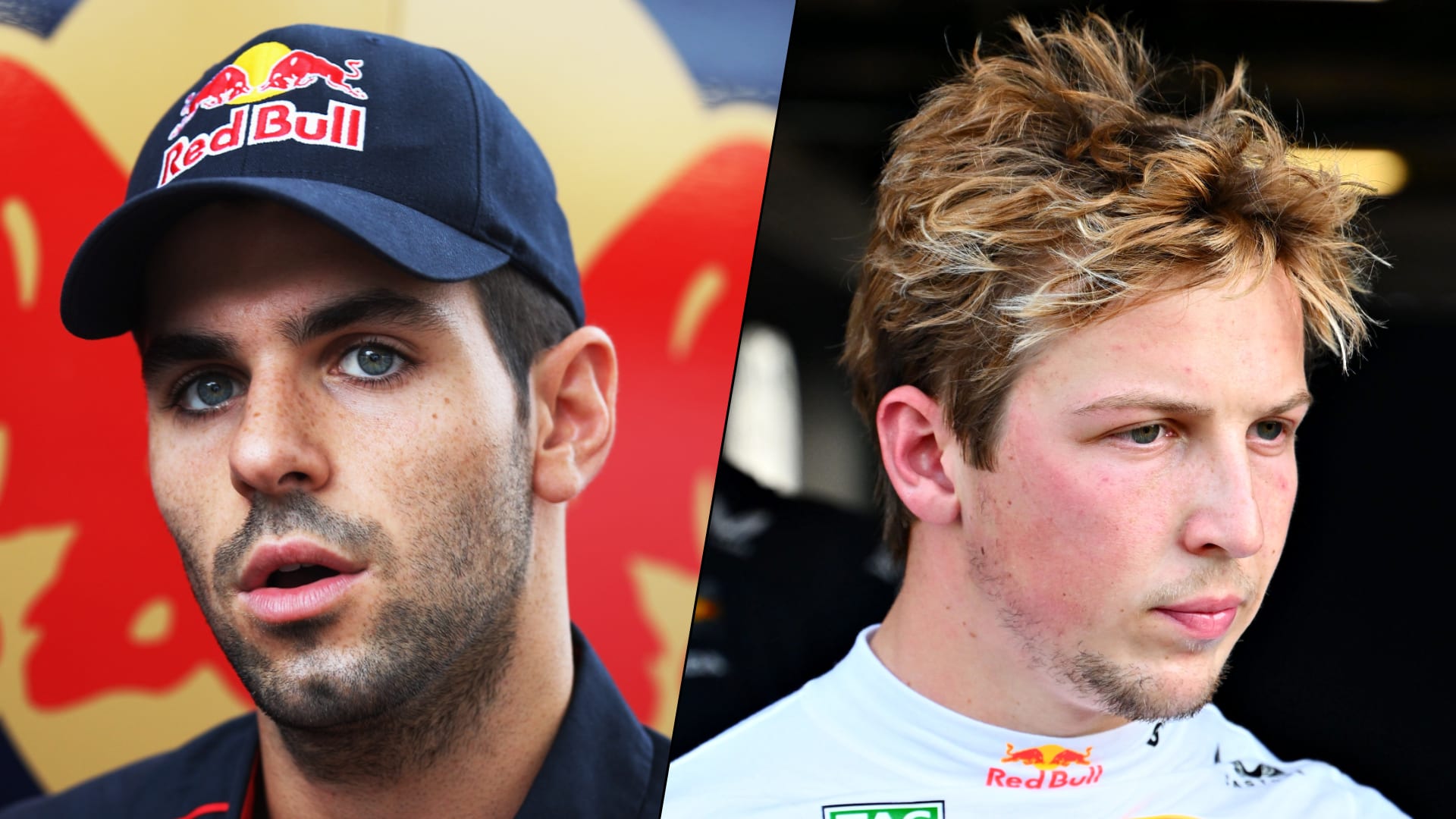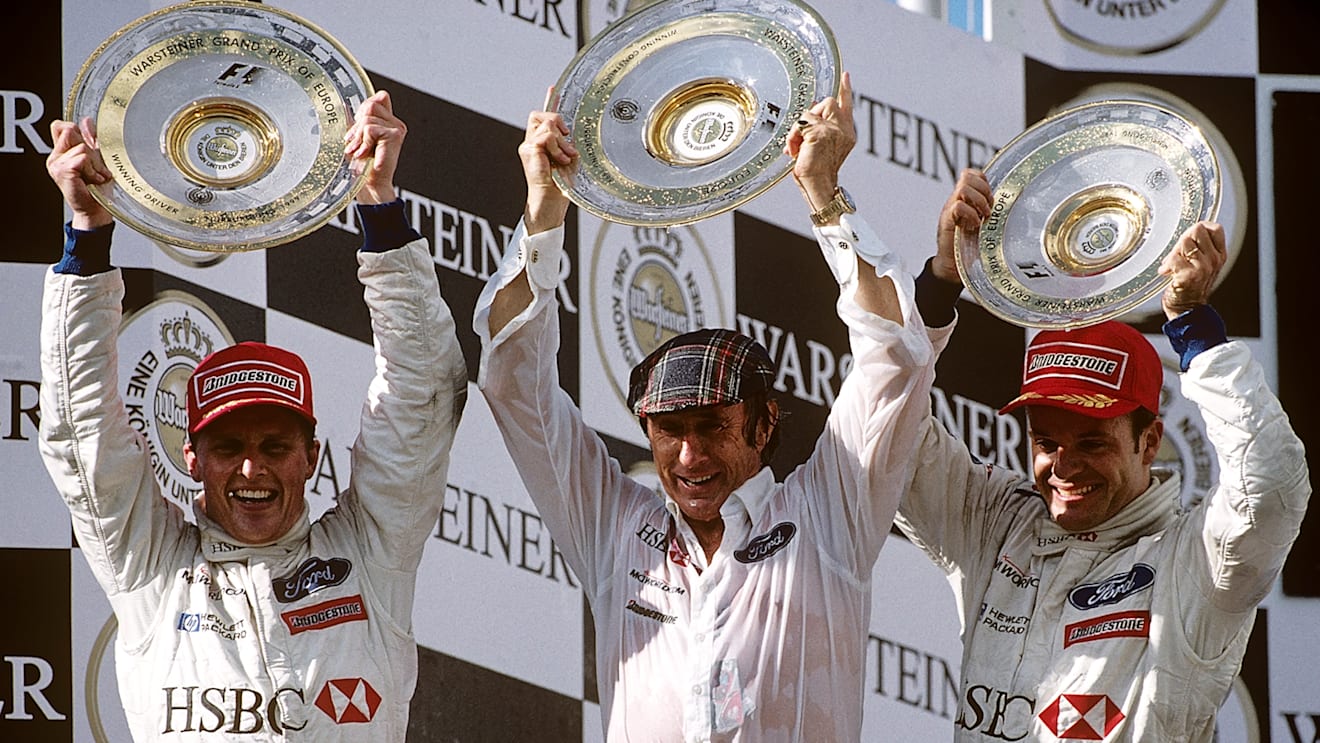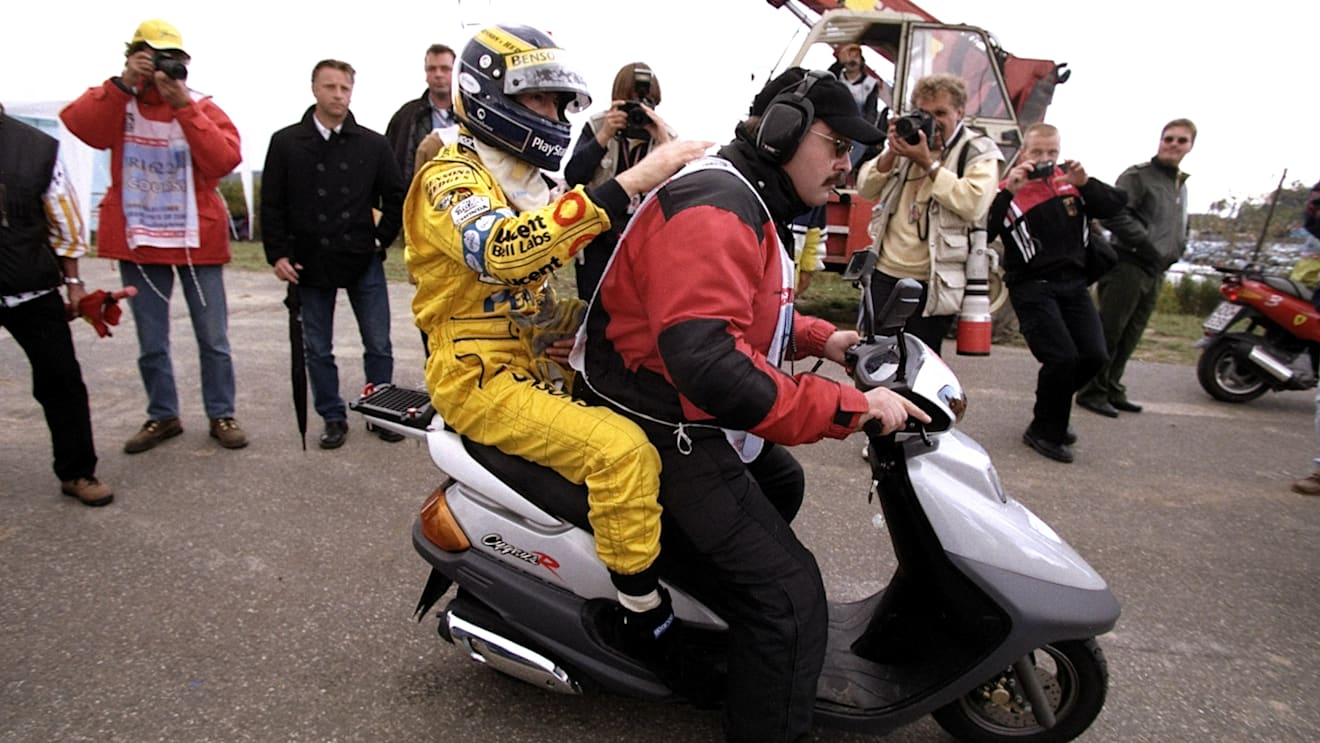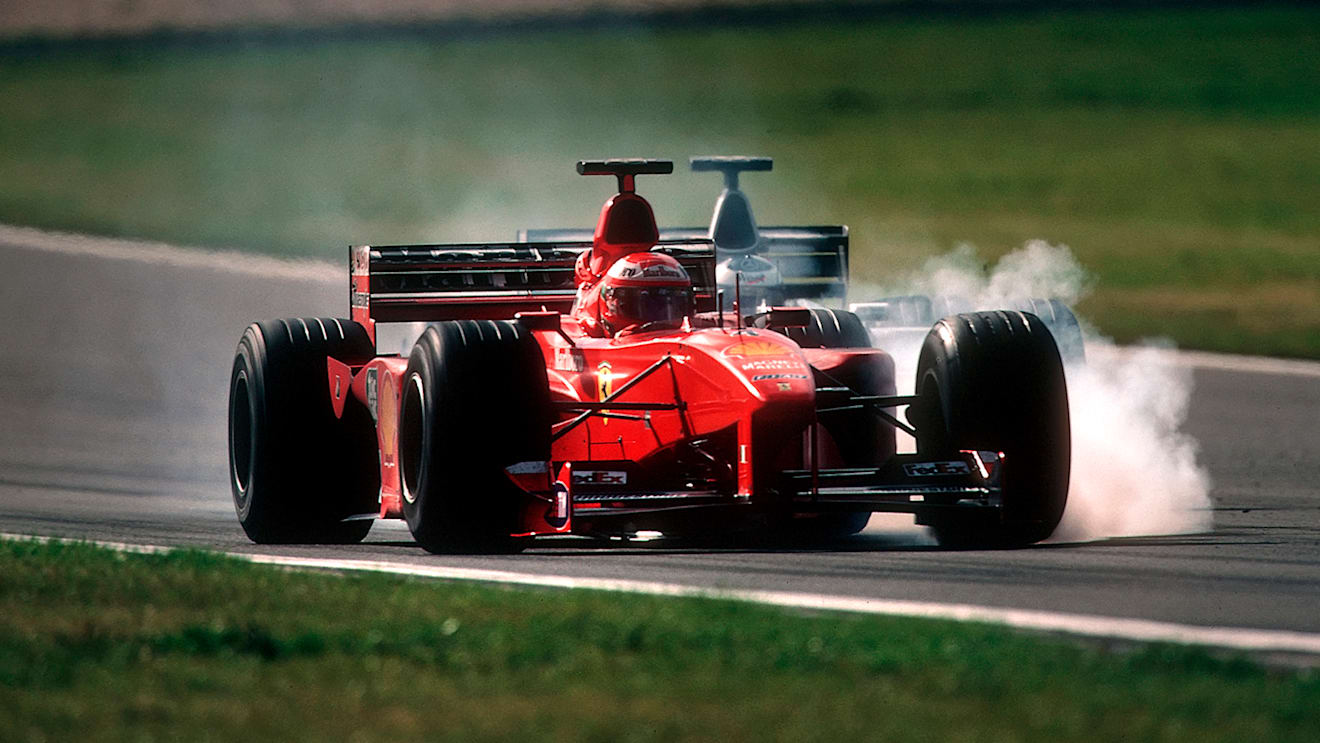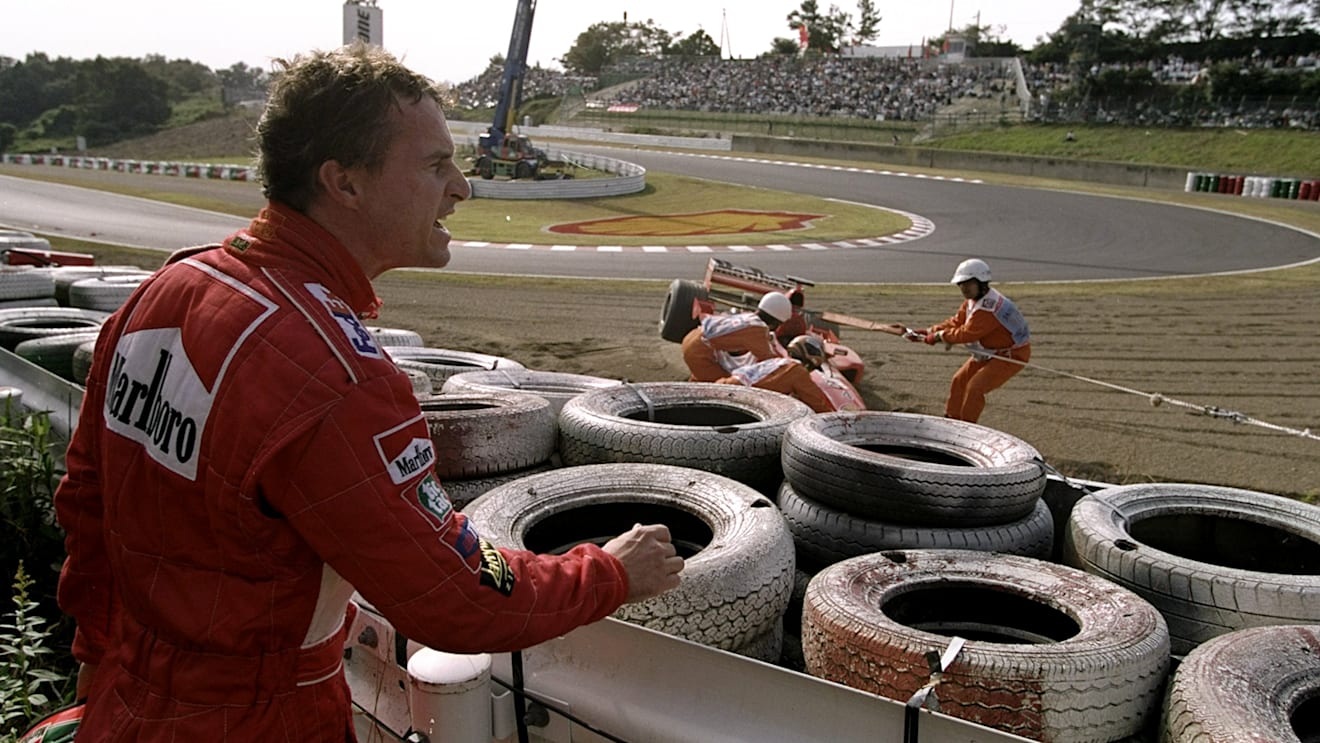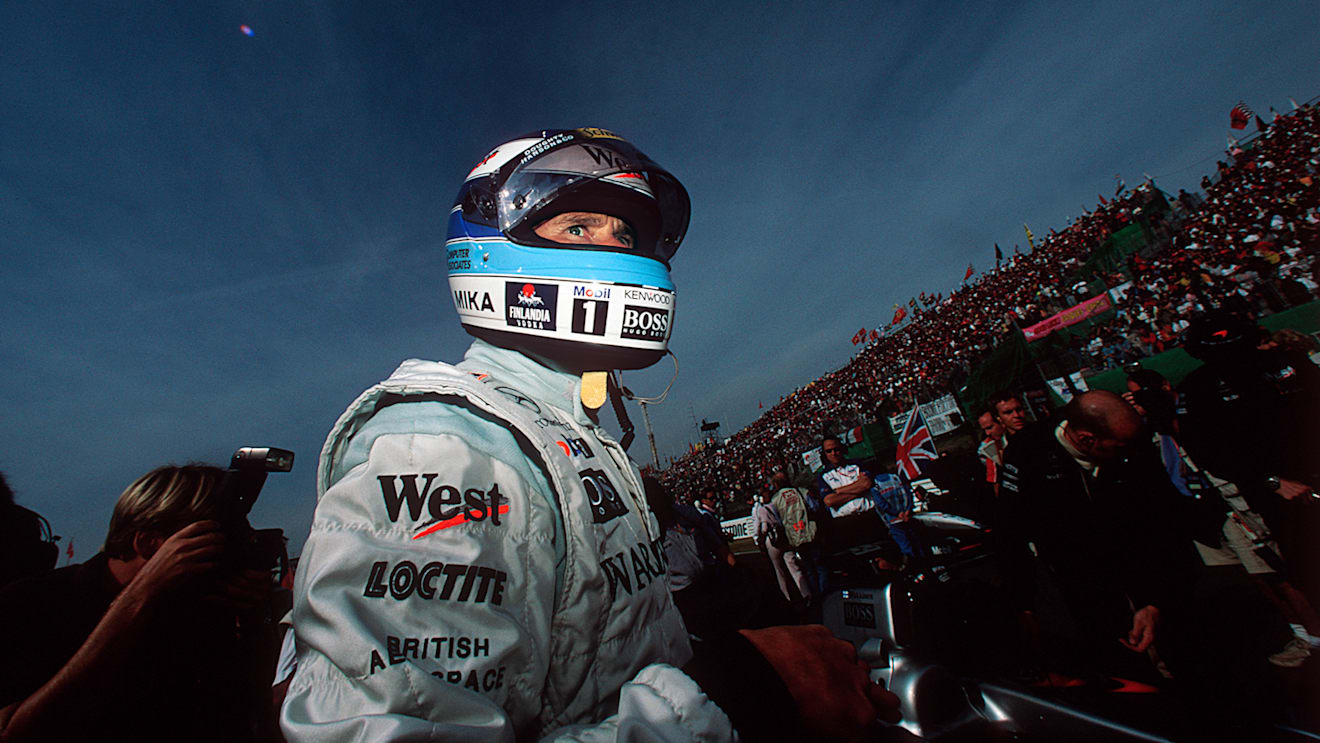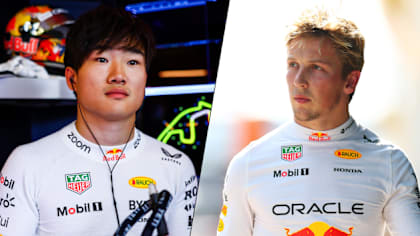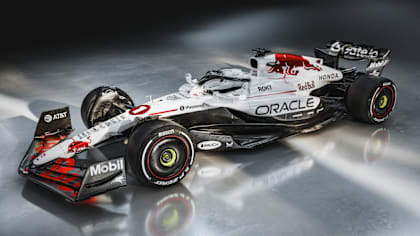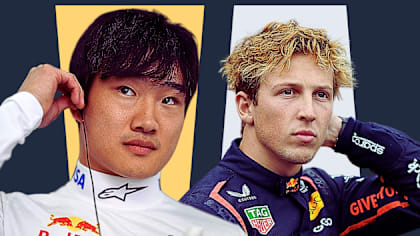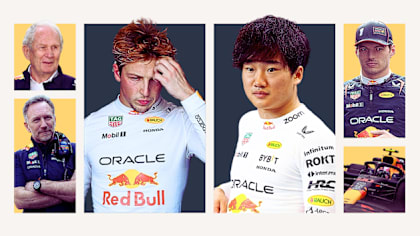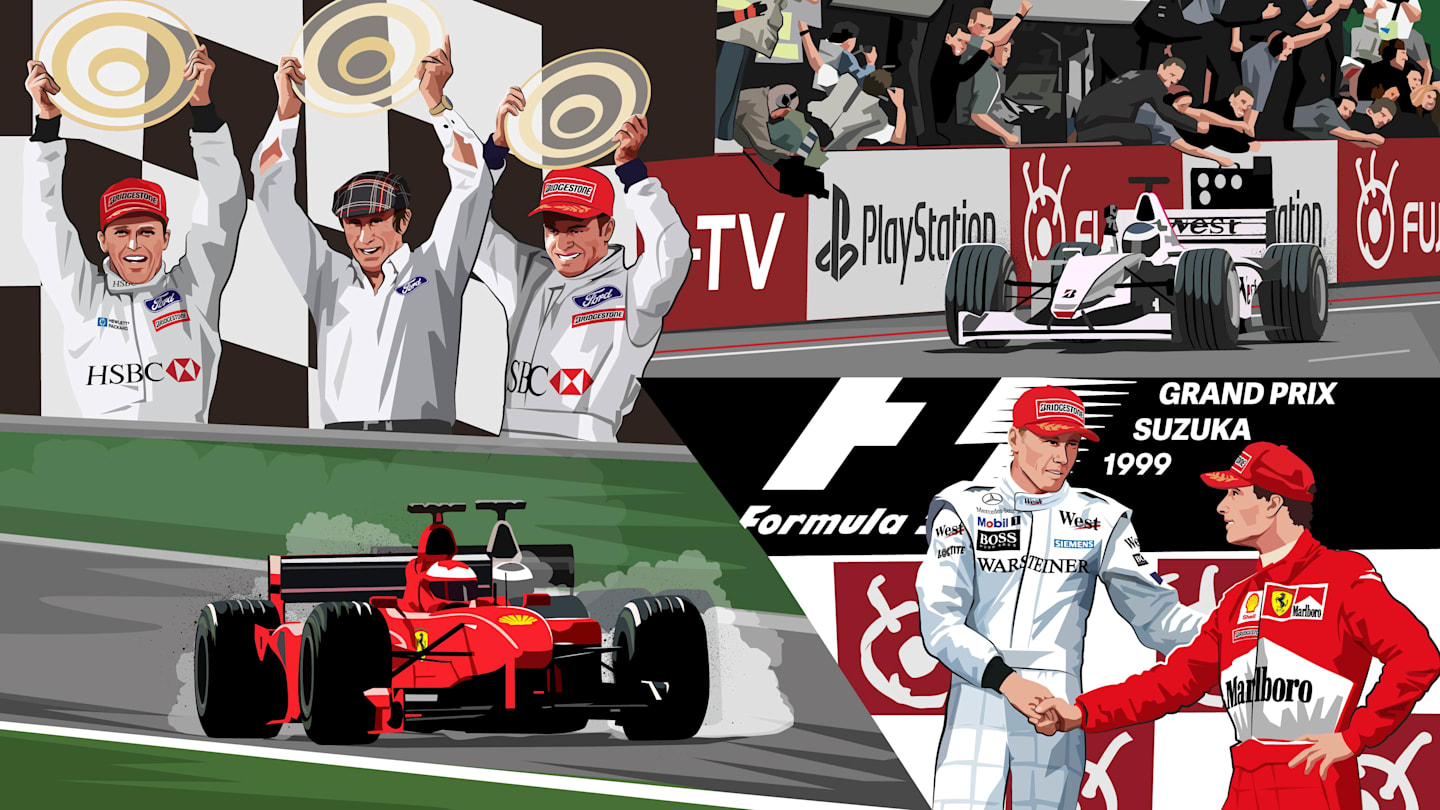
Feature
1999 ORAL HISTORY: Part 3 – Stewart spring a surprise, Schumacher returns, and Hakkinen and Irvine face off

Share

Some 25 years have now passed since a drama-filled Formula 1 campaign that remains etched in the memories of drivers, team members and fans. A thrilling battle between giants McLaren and Ferrari, Michael Schumacher being sidelined by a heavy crash, underdog teams triumphing and the title getting decided at the very final race – the 1999 season had twists and turns aplenty. In a special reflective feature mini-series, we caught up with a host of personalities involved in F1’s 50th year for a special trip down memory lane. Tap here to read Part I and here for Part II – or read on for the third and final instalment…
Stewart deliver a sensational shock victory
If fans thought Monza was intense, they were in for another dramatic weekend amid changeable conditions at the Nurburgring. While title rivals Mika Hakkinen and particularly Eddie Irvine faced problems (more on that later), the Stewart Grand Prix cars of Johnny Herbert and Rubens Barrichello charged their way through the field from mid-grid starting positions to contend for an unlikely win, making the most of a scary first-lap crash, several spins and technical-related retirements elsewhere.
At the end of it all, Herbert was the man who came out on top, having timed his move to wet tyres perfectly, while Barrichello – who lost some time sticking with slicks – backed him up in third position, just behind Jarno Trulli’s Prost. It marked a memorable and emotional moment for Herbert, who had overcome severe foot injuries sustained in his junior single-seater days to record a third and final F1 victory, as well as for the team led by former world champion Jackie Stewart and his son Paul, as they achieved a landmark triumph in what proved to be their third and final F1 season before selling up to Ford and Jaguar.
Johnny Herbert, Stewart Grand Prix driver: “The first thing [I noticed] was the wind when we got on the grid. I was 14th and Rubens was 15th, and all I remember is the wind was blowing directly up the straight. When you go down towards Turn 1, keep going for about 40 kilometres and you’re at Spa, and we know what happens at Spa with the weather. The race started, we got going, then I noticed this cloud in the distance, a bit wider than the track – it looked like a rain drop shape. Then it just got closer and closer. It kept coming dead straight over the middle of the circuit, never went left, never went right. I went, ‘When it comes, it’s going to throw it down’.
1999 flashback: Stewart claim a memorable 1-3 in Germany
“Luckily, when I was about to come in [for a pit stop]… I was doing my in-lap, so I got called in, got to the far end of the circuit, and it just started to spit with rain. As I got back to the pits and stopped, I’d been on the radio and said, ‘Put wets on’. Rubens came in the next lap and put on slicks, so it was something that catapulted me to be in the mix. It [the rain] lasted longer than I thought and I was going 12 seconds faster than anyone else.
“It was very special [to win] because the Nordschleife itself, it was one of Sir Jackie’s last wins there, so there was a connection with my win, their [Stewart Grand Prix’s] first win and Jackie and his racing career at the same time. I was pleased for myself, but I think I was probably more pleased for my crew, who had put in a lot of hard work and stuck by me. It’s always pleasing to see the smiles on their faces when you get back to the garage, and it’s because of them that I was able to achieve my last win.”
ORAL HISTORY: The inside story of Stewart GP’s fairytale ‘99 European Grand Prix victory
Dave Redding, Race Operations and Reliability Engineer, Stewart Grand Prix: “I was looking at car data and health then and you could see everything unfolding, but as people kept stopping and changing tyres as the conditions changed, you just couldn’t believe what you were watching, because you were just thinking, ‘Why are you doing it?’ – it just didn‘t make any sense. Then we thought they were going to catch us and then they stopped again, so [we thought], ‘We’re going to win this’. Then it turns to, ‘Hopefully it doesn’t break down’.
“In those days we didn’t have radar, or not every team; we certainly didn’t have radar or all the things that we have today. As Johnny said, it was more a case of guesswork, really. Even now, at Spa it’s notoriously difficult to predict what the weather is doing, even with the radar and everything else, all the tools you have available. Was it luck? A little bit, because obviously we needed the weather to interrupt. But did we make the right decisions at the right time? Absolutely.
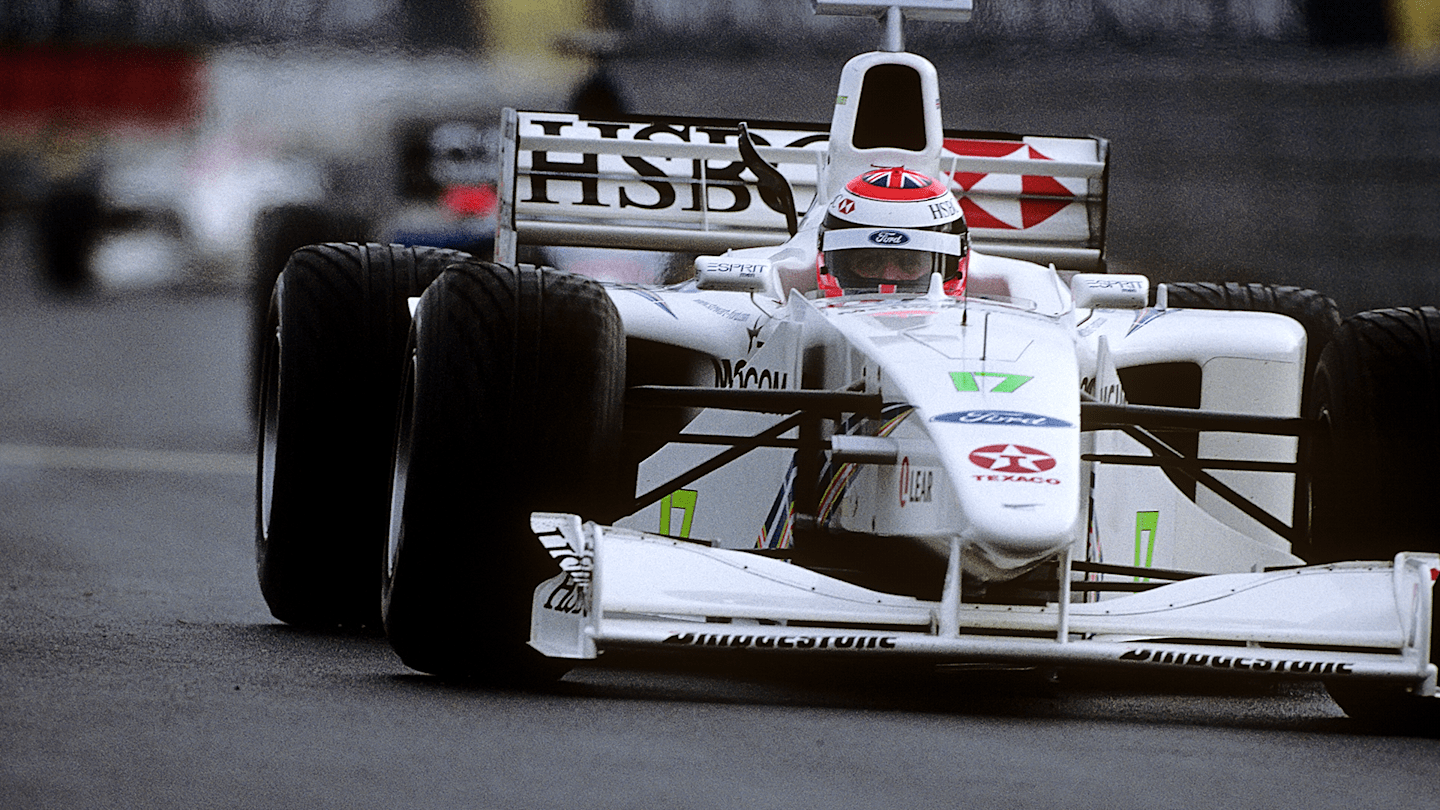
Herbert made the right calls in difficult conditions to secure his third and final F1 win
“Johnny I’ve known for years, because I was at Benetton when he was there, even when he was a young driver when he broke his feet. I’ve known him for a long, long time, so it was very emotional. The next day at the factory, Jackie organised champagne for everybody, so basically it was a half day. We got to lunch time, we’d had champagne and not a lot happened after that! It was a long celebration.”
Rubens Barrichello, Stewart Grand Prix driver: “As soon as we put the car on the track it was amazing. For me, one of the highlights was leading the Brazilian Grand Prix. [Claiming pole position and finishing third at] Magny-Cours was also a good time. The Nurburgring was fantastic for the team, but it was a disappointment [for me] because I [stayed] on slicks. Eventually I won in 2000 [at Hockenheim] with Ferrari because of that, but at the Nurburgring it didn’t work. If it wasn’t for that I was going to win. But still, to be part of the Stewart family, such a nice family, hard-working, with Paul, Mark, and with Jackie, obviously, was phenomenal. That ’99 season gave me a really good chance… It was when I opened the eyes of probably everyone, so I’m so thankful.”
David Tremayne, F1 journalist: “I had this thing with Jackie about clothes. I was wearing Tommy Hilfiger shirts and the like in those days. At Monza, I went to the Stewart team and he said, ‘Oh, ladies and gentleman look, a journalist!’ I said to him, ‘I tell you what, when you guys win a race, I will wear a Tommy Hilfiger shirt and a pair of your tartan trousers’. Anyway, Jackie’s on the podium at the Nurburgring, he’s holding up the plate, then he looks down at me and just points.
“When I was driving back from Heathrow after the race, he phoned and said, ‘David, it’s Jackie, I’d like you to go and see my tailor!’ It was Doug Hayward, this famous guy in Mount Street, and I got fitted for a pair of these tartan trousers, which still fit, funnily enough. Then I had a picture with Paul and Jackie, wearing our tartan trousers – it must have been in Malaysia. But I thought it was wonderful that Johnny won.”
1 / 2
Plenty of sub-plots around Stewart’s success
While Herbert, Barrichello and Stewart all deservedly enjoyed the celebrations, several factors played a role in the result. Firstly, the conditions, which saw several drivers, including Hakkinen, get caught out by running the wrong tyres at the wrong time – leaving the McLaren a lowly fifth. Then, at Ferrari, a painfully slow pit stop, where mechanics haplessly searched for a missing tyre, sent Irvine tumbling down the order to an eventual P7 finish, outside the points.
There were also spins and slides out of the lead of the race for David Coulthard, Benetton’s Giancarlo Fisichella and Williams’s Ralf Schumacher (who picked up a puncture) in the mixed conditions, and arguably the most painful retirement of them all was suffered by Jordan and Frentzen, who had started on pole position but came unstuck when his engine shut down after a pit stop.
Sam Michael, Heinz-Harald Frentzen’s Race Engineer: “I remember the last practice session before qualifying, we’d had a reliability issue, so we spent a lot of time parked in the garage. We got the car fixed in enough time that there was like a minute left, so as long as you get out of the pits, you can go around and do pretty much 99% of the timed lap, apart from the last corner. Heinz had had no practice at all on Saturday morning and he went out, started a timed lap – everyone had been running for 45 minutes to an hour – and all the sectors were purple, purple, purple… It was good enough for P1, easily, so straight away we knew the car was fast, and he qualified on pole.
“The race went really well until the first pit stop. Unlike Monza, where Mika was clearly quicker, we did look like we had enough to take it to them. Then we had the anti-stall cut the engine after the pit stop and that was the end of it. Frustratingly, I’m not sure we even gained much out of using a loophole, that was legal at the time, to try and improve the starts. It wasn’t intended to trigger during a pit stop, it was only for the race start. We were stretching the rules, but isn’t that what F1’s all about?
1999 flashback: Frentzen’s agonising Nurburgring retirement
“The rules at the time did not say how much you had to activate the clutch. What we did was detect low engine revs at the start, put some throttle on but only a little clutch; the theory was to use lower revs and get better traction off the line. There was another part to the rule that said if you trigger an anti-stall and don’t cancel it within 10 seconds on the steering wheel then it turns the engine off, and that’s what happened that day.”
Mark Gallagher, Head of Marketing, Jordan: “There was a point in that race where I remember thinking, ‘Oh my Lord, this might come to us, and it could be epic’, but no sooner had you had that thought everything went pear-shaped and it was game over. When we got the car back, it was fine. Because of my role in marketing and communications, we had to decide what to tell the media. There was a little bit of a moment in the team, because… He wasn’t an extremely senior member of the team, but an important member of the team spoke to journalists and kind of said it was Heinz’s fault, and that was not the way we wanted to play it.
UNCOVERED: Jordan insider explains real reason Frentzen retired from the '99 European GP
“I remember talking to Eddie [Jordan] about it and saying, ‘You win as a team and you lose as a team’, and if we’re going to deal with this we need to be protective of Heinz, because he’s just won two Grands Prix for us and he’s been doing a fantastic job. Do you throw him to the wolves or do you put out a press statement saying we had an electronic issue with the car that caused the stopping? So that’s what we did. But honestly speaking, the degree to which we were in with a shout of winning the championship that year only really became apparent, I think, to many of us, with the passage of time.”
Marco Fainello, Head of Vehicle Dynamics, Ferrari: “I read recently in a paper that Ferrari on purpose could not find the tyre for Eddie at the Nurburgring, that they didn’t want Eddie to win, or Michael on purpose could not allow Eddie to win the championship… I’m sure it’s not the case. Michael didn’t like that someone else was going to win, of course he wants to win it himself, but he would have never done anything bad for the team – he’s really a team man.”
1999 flashback: Irvine endures a painfully slow pit stop
Louise Goodman, ITV F1 reporter: “I remember the tyre incident with Eddie, but a championship is made up of a series of moments good and bad – you can never really pinpoint the ifs, buts and what ifs. Yes, they all contribute, but I think very often, for every driver, somewhere down the line there’s a mistake, an issue, a failure, whatever it might be, and it’s the sum of having less than anybody else that makes for a championship win.”
Sam Michael: “You look at someone like Heinz and that was probably his best chance at a championship. He could look back and wonder what if, but you can also say that the entire year was a resurgence of Heinz, and there was a strong feeling of pride, throughout the whole team, to have played a part in that. A few things went the other way; it wasn’t just that Grand Prix, there were other things that happened during the year. But how many drivers get close to saying, ‘I could have won the world championship?’ It’s a pretty small pool where you can make a mathematical argument that you could have won it. I know it’s not as good as winning it, but that’s the way it is.
“Heinz was really good afterwards with the team. He was annoyed at himself, but that was probably one of the most special things about that team at the time, that we were all in it together – we won together and lost together. We overachieved. We were in a place that we perhaps shouldn’t have been and I remember Damon [Hill] saying to me in the truck after the race that it’s natural to make mistakes when you’re in those positions, because the team isn’t used to it yet.”
Mark Gallagher: “Frankly, the disappointment had to be parked for a while. The weird thing is, if you were going to wish that someone else won the race, I couldn’t have thought of a better person than Johnny, who had won the British F3 championship for Jordan, and Jackie, who had also managed to start an independently owned F1 team. While we’d rather have won, it was quite nice to see another underdog achieve the victory.”
1 / 2
A tense title showdown at Suzuka
There were more incidents to follow at the penultimate round of the season in Malaysia, which was making its debut on the F1 calendar. The weekend marked Schumacher’s long-awaited return to action after his crash at Silverstone and, aiming to prove that it should have been him in the hunt for the title, the Red Baron phenomenally finished almost a full second clear of team mate and nearest rival Irvine in qualifying. On race day, Schumacher dutifully played the team game to hand Irvine victory and the championship lead once more, with Hakkinen salvaging third via a late pass on Nurburgring winner Herbert.
Post-race, controversy engulfed the paddock when the two Ferraris were disqualified over a bargeboard infringement, meaning Hakkinen and McLaren were, in that moment, champions by default. But then, in the week that followed, the decision was dramatically overturned in the FIA courts and the championship rolled on to Suzuka for a showdown. It would all come down to the final race, with Irvine topping the standings by four points. But as the weekend unfolded, Hakkinen could not be stopped…
David Tremayne: “Michael came back for Malaysia and let Eddie win, which was actually quite funny, that he had to surrender a race this time. I’m pretty sure it’s true that [Ferrari Chairman] Luca di Montezemolo found out Michael had been playing football and said, ‘If you’re fit enough to play football, we want you back’, because I think Michael had thought, ‘There’s nothing in this season for me, I don’t want to race for nothing if I can’t win this championship’. That was the feeling, anyway, that he was fitter than he perhaps was letting people think he was and then got told to come back.”
1999 flashback: Hakkinen’s ‘unseen’ pass on Herbert for P3
Claudio Berro, Head of Communications, Ferrari: “On Sunday after the race in Malaysia I was closing my office with my two assistants and they said, ‘Claudio, we have 20 journalists outside. We have 30 journalists, 50 journalists, 100 journalists…’ I said, ‘Okay, but I need to know what happened’. I went to Jean Todt’s office and he was there with Ross Brawn. Both were sat, one watching the other one, with no words. I arrived and said, ‘Hey guys, what happened?’. ‘We don’t know’, they said. I said, ‘Yes, Jean, Ross, but I’m sorry, we have 120 journalists outside, we have to say something’. I wanted to convince them to have a press conference where Ross explained what happened.
“Anyway, the idea to be champion with Eddie at Suzuka was [still] absolutely possible. I read some stories that Ferrari didn’t like to give victory to Eddie… Michael was a serious man, an honest man, who gave his full support for Ferrari and for Eddie. The problem was an Eddie problem, his mind… He started to lose performance [from] pressure. Some people said maybe Eddie’s car was not the same [as Schumacher’s], but it’s more complicated to make two different cars than it is to make two similar cars.
READ MORE: 9 thrilling title-deciding finales from F1 history
“I remember when we finished on the podium, everybody was happy that Ferrari had won the first manufacturers’ title in 16 years, but then Eddie turned to me and said, ‘Claudio, okay, I didn’t win the championship, we won the manufacturers’, but I’m happy that this year is finished – it was too much pressure in my life’. It was very high pressure for him psychologically. The capacity to drive fast was not in discussion, but he had a lot of pressure.”
Marco Fainello: “I remember Magny-Cours [earlier in the season], where we didn’t have a very good race. We were fifth and sixth, Eddie was in front and at a certain point Eddie was asked to let Michael past to get one or two points more for the championship, which he did without any problem. He said on the radio, ‘Imagine if at the end of the year I should be fighting for the championship instead of him’. It was a joke for him. After Michael had the accident, he came and said, ‘Look, you never know what happens in life’.
1 / 2
“He was always very brave, very nice, very relaxed as a second driver, but in those [final] races he was not relaxed. He never told me clearly, but I always had the impression he didn’t want to be in that position. I remember in Japan his face was green and he really suffered [with] the pressure. He did the best job he could and I don’t think he could have done better than that. I’m quite sure with Michael it would have been different. You saw when Michael came back in Malaysia… He came back prepared and the car was very good.”
Louise Goodman: “Eddie probably won’t thank me for saying it, but they always used to say, and I guess it’s still applicable, you don’t know how to win a championship until you’ve won a championship. From what I remember, maybe it was because I was feeling the intensity and pressure from [his sister] Sonia, who had become a close friend… There was a lot of pressure around. Mika had already won a championship whereas for Eddie, you want it more if you’ve never had it, and once you’ve had it you know what you’re aiming for. That was certainly his best chance.
“Also, I can remember thinking that Ferrari really wanted to win the championship, but Eddie winning it for them wasn’t the story, it was Michael. Maybe that’s just my perception. That was the whole deal for Michael, wasn’t it? Coming to Ferrari, not just him, but with Ross and the whole team, delivering together, so to have this cocky little s*** from Northern Ireland coming in and stealing the thunder… Of course they would have loved it, but I remember the feeling, not just from me but from a lot of other people around the paddock at the time, that this is not going to p*** them off, but this is not the plan.”
Mark Arnall, Mika Hakkinen’s performance coach: “Obviously you go through the emotions of thinking you’ve won the championship, then the reality is you haven’t. It’s great if you can win before the last race, but if you can’t, you can’t. We just carry on, there’s another race left, and we’ve got to win it. Mika was always incredibly good in Japan and it was one of his favourite tracks. I think when you’re going to a track that you know suits your driving style and you know you’re good at then you feel comfortable being able to – as Mika would say – go flat-out. He’d also won there the year before, so there was quite a lot of positive reinforcement.”
1999 flashback: Hakkinen comes out on top in Japan
Mika Hakkinen, McLaren driver: “It went to the last Grand Prix and I had a doubt… I wasn’t sure if I was going to make it. I knew Michael was there, I knew Eddie was very strong. The only time in that weekend when it changed was that Eddie had a big accident [in qualifying]. He hurt his back, I think he destroyed his chassis, so I knew he was gone, out of the picture. I knew straight away that was it, he has no chance. Also psychologically, I built myself [a picture] that that’s it. It was like, ‘Use this opportunity’. It was a happy ending [with pole and the win]. Two titles are better than one, and one is better than zero!”
Enrico Zanarini, Eddie Irvine’s manager: “When we came back from Suzuka that day we were a bit sad. We were in Eddie’s room, in the Tokyo hotel, and we were talking about it. We said, ‘S***, we really were so close to it, so close to it’. But the championship did not come our way and we were not good enough in the last race – that was it. As Eddie said to me once, it’s a shame, because when you win a championship it’s printed there, it’s bonded on stone. But there were so many things happening in 1999, so many incredible episodes.
“I think the key moment was at Sepang. Michael and Eddie [were at the front], Herbert was third with three laps to go, and Hakkinen was struggling to keep up. Herbert went a little bit over a kerb, the car went sideways, and Mika was able to overtake him – then Mika came third. Had that not happened, we would have arrived at Suzuka with [enough of a] points advantage that even if we came second, we would have won the championship. Not many people probably noticed that, but I classify it as the episode that lost us the championship.
“The following year, Eddie was sitting in his Jaguar at Suzuka. I was behind [the scenes], like all managers, leaning on the wall, watching whatever was happening. A mechanic came to me and said, ‘Eddie wants to speak to you’. Normally a manager doesn’t go near the car during practice to talk to his driver, and I’m certainly not the guy [to do that], not even if I want to tell him something. I was surprised, but I went down to him, he looked at me and said, ‘I think I know what went wrong last year’. That’s the last time we talked about it. The rest I cannot tell you!”
Final standings
| Drivers’ | Constructors’ |
|---|---|
| Mika Hakkinen: 76 points | Ferrari: 128 points |
| Eddie Irvine: 74 points | McLaren: 124 points |
| Heinz-Harald Frentzen: 54 points | Jordan: 61 points |
| David Coulthard: 48 points | Stewart: 36 points |
In case you missed them, catch up on Part I and Part II below...
1999 ORAL HISTORY: Part 1 – McLaren vs Ferrari, Hakkinen vs Schumacher, and drama at Silverstone
YOU MIGHT ALSO LIKE
News Tsunoda to replace Lawson at Red Bull from Japanese GP as New Zealander drops down to Racing Bulls
Image Gallery GALLERY: Red Bull unveil special white and red livery for Japanese Grand Prix
OpinionF1 Unlocked JACQUES: Tsunoda’s Red Bull promotion is a deserved reward – but Lawson needs to take inspiration from Gasly and Albon
Feature ANALYSIS: Why Red Bull decided swift action was needed as Tsunoda is promoted in place of Lawson
